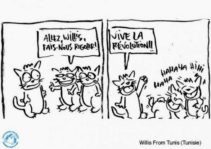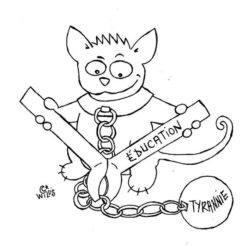Nadia Khiari
Tunisia
Andrew Bennett & Kaylynn Mayo
Nadia Khiari, a painter and director of an art gallery in her native Tunisia, says she felt like a zombie before the Tunisian Revolution. Any criticism of the government or of former Tunisian president Zine El Abidine Ben Ali and his family was seen as an attack on the country. When Ben Ali fled the country on 14 January 2011, Khiari felt like she was finally born—and her cartoon vehicle for political satire, Willis from Tunis, emerged. 1 Thanks to social media, Willis from Tunis quickly gained popularity and became an artistic symbol of the new Tunisia.
Originally Willis from Tunis appeared as an amusing form of protest in street art and as a blog to be shared amongst Khiari’s friends and family while they were locked in their homes during the curfew imposed in the wake of the revolution. 2 Taking advantage of the surge of freedom of speech in the country, Khiari has since created a new cartoon each day to comment on the current state of affairs in Tunisia. Using pen and ink and water color, Khiari keeps the composition of her works simple and allows the character of Willis to vocalize what is on Khiari’s mind. Although her cartoons are all in French, many are easy to understand without knowledge of the language.
Her political cartoons in this exhibition—J’ai faim (I’m Hungry) (2011), Vive la Révolution!! (2012), and Education/Tyrannie (2013)—highlight the revolution’s ongoing effect on the Tunisian people. J’ai faim reveals that Tunisian rights campaigns often forget the most basic human need – to eat. Sarcasm informs Vive la Révolution!!, which shows several characters asking Willis to “Make Us Laugh.” His response “Vive la Revolution!!,” elicits hysterical laughter from those who see the revolution as a joke. Despite the pessimistic implication of this cartoon, however, Khiairi is hopeful about the revolution and the future of Tunisia. She notes, “We lived 50 years in a dictatorship, so we will not learn in one year what is freedom of speech, what is freedom of mind, what is freedom of women. We are building it. It will take time. I am optimistic.” 3 Education/Tyrannie is a comment on the importance of education, which—even with high unemployment among college-educated Tunisians—will in Khiari’s view, free the people from the chain of tyranny.
Khiari has not gone unnoticed by critics; in April 2012, she received the Award Honoré Daumier at the second international meeting of Cartooning for Peace in Caen, France and was awarded Doctor Honoris Causa in September 2013 at the University of Liège. 4 Her cartoons continue to show the world that the Tunisian revolution lives on.
- Nadia Khiari, “Willis in Tunis,” Born Again in Revolution, vimeo.com/52972332 ↑
- Vanessa Rousselot, “Nadia Khairi (Cartoonist, Tunisia),” Samar Media, Stand Alone Media2, July 27, 2012, http://www.facebook.com/SamarMediaTv, www.youtoube.com/watch?v=vFIHWRH28b4 ↑
- Nadia Khiari, “Willis in Tunis,” Born Again in Revolution. ↑
- Cartooning for Peace, “Cartoonists: Willis from Tunis,” www.cartooningforpeace.org/en/dessinateurs/willis-from-tunis/ ↑



